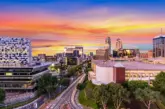Growth of aviation sector underpinning occupier demand across industrial property landscape in Dubai and Abu Dhabi
Almasalla Arab Travel Portal News -Dubai- Since opening as a cargo hub in June 2010, Al Maktoum International Airport at Dubai World Central has quickly expanded, with passenger services commencing seven months ago.
The emerging aerotropolis sits at the centre of Dubai’s future, with the near by Expo 2020 site, residential and commercial cities and Jebel Ali Freezone all set to play a crucial role in the long term evolution of the emirate’s economy, according to leading real estate consultancy, Cluttons.
For now, Al Maktoum International is cementing Dubai’s position as one of the world’s leading logistics hubs through the successful marriage of the airport’s air cargo facilities with the extraordinary capabilities of Jebel Ali Port.

The awarding of the 2020 World Expo to Dubai in November has helped to catalyse demand from industrial occupiers, many of whom are honing in on surrounding freezones as they look to position themselves at the gateway to what will inevitably be one of the world’s largest and most efficient multi nodal transport hubs.
Etihad Rail’s announcement last month that freight line stations in both Jebel Ali Port and Al Maktoum International are under consideration will no doubt further enhance the appeal of the area to industrial and logistics firms.
Cluttons International Research and Business Development Manager, Faisal Durrani comments: “Following the Expo 2020 announcement in November, we have certainly recorded stronger demand from occupiers for areas in and around Al Maktoum International Airport and Jebel Ali. The unveiling of Etihad Rail’s freight line through the area will further enhance the appeal of a base at DWC.”
“Furthermore, reports this week have confirmed that both Dubai International Airport and Al Maktoum Airport will continue to operate side by side, with the latter likely to emerge as a new hub for Emirates some time in the mid 2020’s. We expect that the announcement will help lift occupier demand levels further as the speculation on the future of our city’s two airports will now gradually fade as plans are finalised for both DXB and DWC.”
Durrani adds: “As occupier demand levels rise in submarkets around DWC, we anticipate the expansion of freezones where possible and an increased amount of speculative warehouse development, particularly as these areas approach saturation. The economic vibrancy, which has been underpinned in part by the tourism and hospitality sectors is expected to contribute significantly to the rise in the number of purpose built facilities”

Dubai Industrial City (DIC) for instance, is reporting strong occupancy levels, with a vacancy rate of just 5%. 158 new companies joined DIC last year and a sharp upturn in revenue from warehouse and land leases was also reported, both of which rose by 52% and 44%, respectively.
Similarly, rents in Dubai Investments Park (DIP) for industrial units have continued to move upwards. Activity at DIP remains dominated by distribution, light manufacturing, food and beverage (F&B) and cold storage companies, fuelled by the buoyancy in the hospitality sector. The latter added an estimated 500,000 jobs to the UAE economy last year, according to the World Travel and Tourism Council.
Cluttons also anticipates Techno Park, which sits just opposite Dubai Logistics City, to record an uptake in occupier interest as the surrounding freezones reach full capacity. Techno Park is likely to emerge as a particular favourite due to its strategic positioning between Sheikh Zayed Road (E11) and Mohammed Bin Zayed Road (E311) and also due to its proximity to Al Maktoum International Airport.
Durrani concludes: “Elsewhere in the UAE, industrial occupier focus also remains centred on emerging multi-nodal hubs. In Abu Dhabi for instance, the importance of Abu Dhabi International Airport continues to gather pace, aided by the brisk expansion of Etihad Airways, which is underpinning the importance of the airport as an air cargo hub. This is evidenced by both the swift letting of warehouses at Logistics Park and the number of enquiries being reported. This is a pattern we expect to persist.”







